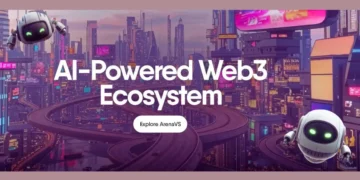Coinbase CEO Brian Armstrong recently floated the concept of a decentralized Web3 take on LinkedIn’s professional networking platform. Leveraging soulbound tokens as verifiable credentials, a “Web3 LinkedIn” could enable open and interoperable career profiles.
Armstrong aired the idea publicly on Twitter, sparking discussions around reforming recruitment and networking using blockchain technologies. However, constructing a fully decentralized alternative to LinkedIn brings significant adoption challenges.
Envisioning a LinkedIn for Web3
In his tweet, Coinbase CEO Brian Armstrong conveyed enthusiasm for a Web3 reboot of LinkedIn focused on decentralization:
“It would be great if companies could issue Soulbound NFTs, to verify employment or credentials. Developing a way to initiate the network effect (probably the hard part), would be to allow users to create their own SBTs, by verifying a company email.”
For Armstrong, soulbound tokens (SBTs) – non-transferable NFTs – could serve as building blocks for digital professional identities and credentials. A blockchain-powered LinkedIn could enable open job networking beyond centralized platforms.
Armstrong suggested allowing users to mint SBT credentials via verified company emails to bootstrap adoption. This decentralized professional network could address limitations of traditional platforms.
5/ I added a bonus idea: Web3 version of LinkedInhttps://t.co/hhBLqysQ72
— Brian Armstrong (@brian_armstrong) September 6, 2023
The Potential Benefits of Decentralized Networking
A Web3 version of LinkedIn could offer several advantages:
- Interoperability – Professional SBT credentials could integrate across different apps and services rather than siloed on proprietary platforms.
- Ownership & control – Users would own and control their career data rather than LinkedIn owning profiles.
- Transparency & accuracy – Blockchain verification of SBT credentials brings reliability and transparency.
- Censorship resistance – Decentralization resists account suspensions or content removal by centralized authorities.
- Accessibility – Open-source protocols could enable free access rather than paid subscriptions.
The Challenges of Adoption and Implementation
While alluring in theory, constructing a fully decentralized networking platform poses huge real-world obstacles:
- Onboarding users – Attracting professionals from established LinkedIn without competitive features and network effects.
- Verifying credentials – Ensuring legitimacy of user-created SBTs and preventing fraud.
- Incentivizing participation – Driving corporate adoption for issuing verified SBT credentials.
- Regulatory compliance – Navigating aml, kyc, and data protection regulations governing employment data.
- Product capabilities – Matching LinkedIn’s hireability signaling and advanced recruiting tools.
Overcoming these adoption challenges requires substantial technical execution and financial resources with no guarantee of displacing dominant platforms.
LinkedIn’s Centralized Network Effects
Part of the immense difficulty in launching a “Web3 LinkedIn” stems from LinkedIn’s entrenched position. The Microsoft-owned company benefits from powerful network effects:
- 900+ million members as the world’s largest professional network
- 30+ million companies leveraging LinkedIn for hiring and advertising
- 740+ million knowledge workers relying on LinkedIn for opportunities
- Sophisticated algorithms for profiling, search, and recruitment
- Premium business offerings driving $10+ billion in annual revenue
Any competitor must contend with LinkedIn’s ecosystem gravity while offering differentiated value. For a Web3 option, lacking centralized network effects magnifies go-to-market hurdles.
Soulbound Tokens as Pioneering Web3 Identity Credentials
Although Web3 presents challenges, soulbound tokens symbolize its potential for professional credentials. As non-transferable NFTs permanently linked to holders, SBTs enable verifiable digital identities.
Various projects are building out decentralized identifier (DID) frameworks using SBTs across areas like qualifications, memberships, licenses, and certifications. With blockchain transparency, soulbound tokens promise reliability absent intermediaries.
If blockchain-based credentialing gains traction, SBTs could eventually form the basis of verifiable professional profiles. But progress will hinge on Web3 tools reaching mainstream acceptance and providing concrete benefits over current systems.
More info here
Conclusion
While an appealing blueprint for open and transparent networking, executing a fully decentralized Web3 alternative to LinkedIn remains an imposing undertaking given LinkedIn’s dominance.
Soulbound tokens present a promising path for blockchain-verified professional credentials. But the barriers around adoption, product market fit and competing with an entrenched leader are not easily surmounted.
Still, some opportunities likely exist to leverage Web3 technology to improve specific elements of job searching, vetting and recruitment. Rather than attempting to unseat LinkedIn outright, targeted decentralization of business processes could yield dividends.
Although plenty of challenges persist, bold thinking by leaders like Brian Armstrong moves the conversation forward around blockchain technology’s emergent potential to reshape economic participation.
FAQs
How would a Web3 LinkedIn differ from the current LinkedIn?
It would use blockchain and soulbound tokens for decentralized, self-sovereign professional profiles rather than centralized control.
What are the main benefits of a decentralized professional network?
A: Interoperability, ownership, transparency, accuracy, censorship resistance, accessibility.
What are the main obstacles to building a Web3 LinkedIn competitor?
Onboarding users, verifying credentials, incentivizing participation, regulations, replicating product capabilities.
How could soulbound tokens be used in a Web3 LinkedIn?
As verifiable credentials for employment, education, skills, licenses, and other professional qualifications.
Who originally came up with the idea for a Web3 LinkedIn?
The concept was floated by Coinbase CEO Brian Armstrong in a tweet.
Follow us on our social networks and keep up to date with everything that happens in the Metaverse!
Twitter Linkedin Facebook Telegram Instagram Google News Amazon Store












































